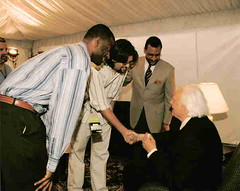A Case Study in Innovation
From "How Apple Does It", Time (10/24/05):
"Ask Apple CEO Steve Jobs about [cool stuff], and he'll tell you an instructive little story. Call it the Parable of the Concept Car. 'Here's what you find at a lot of companies,' he says, kicking back in a conference room at Apple's gleaming white Silicon Valley headquarters, which looks something like a cross between an Ivy League university and an iPod. 'You know how you see a show car, and it's really cool, and then four years later you see the production car, and it sucks? And you go, What happened? They had it! They had it in the palm of their hands! They grabbed defeat from the jaws of victory! "'What happened was, the designers came up with this really great idea. Then they take it to the engineers, and the engineers go, 'Nah, we can't do that. That's impossible.' And so it gets a lot worse. Then they take it to the manufacturing people, and they go, 'We can't build that!' And it gets a lot worse.' "When Jobs took up his present position at Apple in 1997, that's the situation he found. He and Jonathan Ive, head of design, came up with the original iMac, a candy-colored computer merged with a cathode-ray tube that, at the time, looked like nothing anybody had seen outside of a Jetsons cartoon. 'Sure enough,' Jobs recalls, 'when we took it to the engineers, they said, 'Oh.' And they came up with 38 reasons. And I said, 'No, no, we're doing this.' And they said, 'Well, why?' And I said, 'Because I'm the CEO, and I think it can be done.' And so they kind of begrudgingly did it. But then it was a big hit.' "There are two lessons to be drawn from that story: one about collaboration, one about control. Apple employees talk incessantly about what they call 'deep collaboration' or 'cross-pollination' or 'concurrent engineering.' Essentially it means that products don't pass from team to team. There aren't discrete, sequential development stages. Instead, it's simultaneous and organic. Products get worked on in parallel by all departments at once--design, hardware, software--in endless rounds of interdisciplinary design reviews. Managers elsewhere boast about how little time they waste in meetings; Apple is big on them and proud of it. 'The historical way of developing products just doesn't work when you're as ambitious as we are,' says Ive, an affable, bearlike Brit. 'When the challenges are that complex, you have to develop a product in a more collaborative, integrated way.' ... "The second lesson of Jobs' parable is about control, and to that extent, it's a lesson about Jobs himself. He is one of the technology world's great innovators but not because he's an engineer or a programmer. He doesn't have an M.B.A. either. He doesn't even have a college degree. (He dropped out of Reed College after one semester.) Jobs has a great native sense of design and a knack for hiring geniuses, but above all, what he has is a willingness to be a pain in the neck about what matters most to him. "Sure, Jobs is perfectly pleasant to be around. And he pays attention to what you're saying, but if he disagrees with it--if, hypothetically, you're maybe airing a pet peeve about the fact that iMacs have all their ports in the back, where they're hard to get at--he'll come storming back and hammer at you until you change your mind or at least shut up. When he generously introduces you to the guy who runs Apple's iTunes development team, Jobs makes it clear that you're welcome to meet him but you can't print his name. Jobs doesn't want competitors poaching his talent. 'You can mention his first name but not his last name,' Jobs says. 'How's that?' It'll have to do. The guy's name, by the way, is Jeff. "In other words, Jobs is into control. In itself, that is of no real importance, except that in a lot of ways, Apple is an expression of Jobs' personal ethos. One reason Apple makes its own hardware and software is that when Jobs goes to the trouble of creating a piece of software, he doesn't want it running on hardware built by a bunch of dudes he doesn't know and can't fire. He wants it on hardware he makes himself. How else can he be sure that every little thing integrates together the way he says--nay, insists--it should?"













2 Comments:
This is a perfectly interesting article. I was hoping that we'd have some of your thoughts and reflections on how it might be relatable with leadership in a Christian context or the like... on one hand we have the possibility that this suggests that the democritization of leadership is adverse to having one person dictate (however wise or unwise) how things should go...
or maybe the take home message is that we as Christians or as earnest forward looking members of human society have continually missed the point... have settled in terms of reaching that vision... that perhaps the way we "do" organization just falls flat because of refusing to honor every member invovled or fails to properly attempt to recognize ever member involved....
Ruben,
Great thoughts, and thanks for asking my opinion. I would have posted more reflections yesterday, but for a lack of time.
I guess I would draw at least two two parallels to the church from the excerpt I quoted. First, the need to respect and value and embrace and empower the various members of the body to collectively be the body. If "nothing is impossible with God," and we "can do all things through Christ who strengthens us," then innovation and design and relevancy and deliverance and transformation and all the other things the church pays lip service to are within the realm of possibility. They are not being actualized because (a) we don't believe our own hype and (b) we don't empower the inividual parts of the body to shine according to the gifts God has given them so that together we can collaborate and produce the kind of success we all long for.
Second, it demonstrates the need for accountability. Though we know intellectually that Christ is the head of the body and the Holy Spirit brings conviction, sometimes it's easy to ignore the head and the conviction unless brothers and sisters are holding us accountable to our word and our gifts. According to the article, Steve Jobs empowers people to thrive in their gifts, collaborate on a unifying vision/idea, and then holds them accountable to that vision. I get the impression (rightly or wrongly, I'm not sure) that people like to work for Jobs despite his "control" -- i.e. accountability -- because he (and they) produce results that people can be proud of.
Similarly, I look forward to the day when the church produces results that "shine like stars in the universe" (Philipians). That passage in Philipians is actually quite revealing about how we get there.
Post a Comment
<< Home